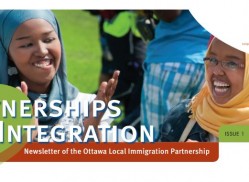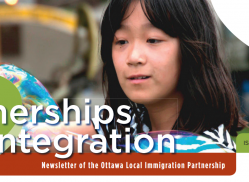Partnerships for Integration Newsletter (PIN) is an electronic publication produced by OLIP that provides bi-annual updates on Ottawa's progress on the Ottawa Immigration Strategy (OIS). It introduces new and promising initiatives, shares ideas and perspectives on the work of OLIP, and promotes shared understanding on challenges and gaps.
PIN functions as a vehicles for information flow and dissemination of good practices within OLIP's vast, multi-sectoral network; and as a means of communicating the achievements of OLIP partners to external community stakeholders.
PIN issues follow a consistent content design, which typically includes the following sections: Perspectives on Immigrant Integration; Featured Action on OIS; Honour Roll; Tips & Tools; Newsflash; and Community BUZZ to introduce new and promising initiatives. Some issues of PIN may have a thematic focus, to allow for a deeper discussion on selected topics.
Content of the PIN issues is provided by the OLIP partners and edited by the Secretariat. If you are an Ottawa organization whose work is related to immigrant integration and you have story ideas for the PIN, we encourage you to contact us at info@olip-plio.ca.


 All the WOW events that I went to were great – WOW does give a sense of a community trying to improve its attraction and retention!
All the WOW events that I went to were great – WOW does give a sense of a community trying to improve its attraction and retention!

